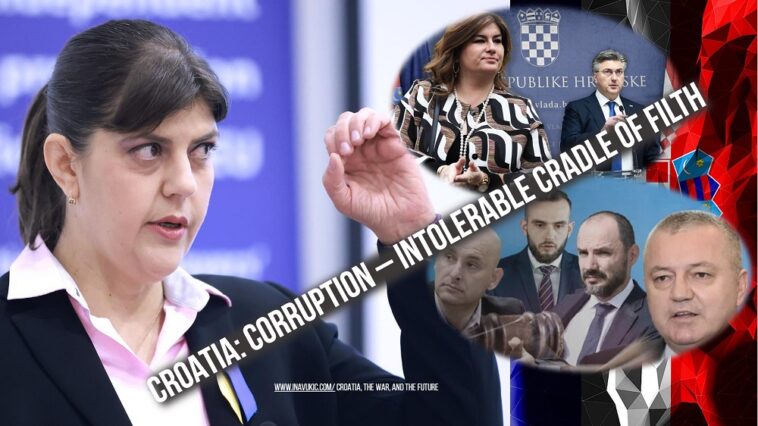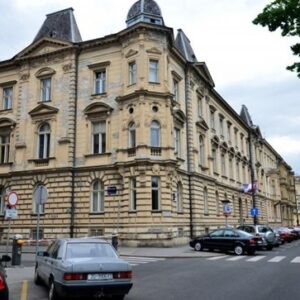As I wrote last week, there was a motion by Croatia’s parliamentary opposition to recall the Prime Minister Andrej Plenkovic with claims, in particular, that he is, among other things, personally responsible for failing to act in curbing corruption which is relentlessly plaguing the country and failing to effectively address and deal with the devastation caused by the earthquakes in Croatia since March 2020. This attempt to depose the Prime Minister from office was not successful. Andrej Plenkovic survived the no confidence vote in the Croatian Parliament on Friday 3 March 2023.
The 77 against and 56 for the confirmation of no confidence with one abstention and 17 opposition members of Parliament missing in action (did not turn up for voting) in the 151-seat assembly provided a rather clear picture that was expected at this time of political turmoil, economic crisis and living standards uncertainties due to price hikes for food and energy. The governing majority votes favoured Plenkovic as leader and Prime Minister. However, despite the colourful differences in both ideology and policy among the opposition political parties, the parliamentary opposition also rose united as well. Nobody is “crossing the floor” on the matter of Prime Minister’s performance in the above key areas from any side of politics just yet, it seems. But, should the Croatian judiciary act more appropriately and with due and deservingly urgent haste in processing indictments for corruption that occurred in the very heart of Plenkovic’s government, should the judiciary work faster in collecting needed evidence to be tested in court, then anything is possible. Even a catastrophic loss by HDZ in 2024 general elections. In the face of so much corruption, in the face of harsh living standards due to price increases of basic and essential food and other essentials for life, no amount of gloss Plenkovic is painting over the economy will stop the corrosive bitterness and disappointments the voters seem to be expressing every day. Pending the 2024 parliamentary elections in Croatia we are now on a most interesting ride which, God willing, will see increased attacks on the communist mindset polluting the democracy Croatia should be, but is not living.
The European Public Prosecutor’s Office (EPPO) has recently published its 2022 Annual Report. Since its launch in June 2021, EPPO opened offices in 22 EU countries, including a branch in Croatia. Its main purpose is to monitor, track and investigate the expenditure of EU funds given to a country and its successful funds applicant organisations.
On the face and perhaps the substance of EU funds given this has changed the [corruption] situation significantly. One may say that the corrupt habits acquired during the life of communist Yugoslavia that groomed people who wielded political power who perhaps could have exerted influence over local investigators are no longer that powerful for EU money and under EPPO’s rudder. And while Croatia itself has an anticorruption body USKOK (Office for Suppression of Corruption and Organised Crime) attached to the State Attorney’s Office (DORH) as a special operations unit dealing with all except fraud and corruption associated with EU funds attended to by the EPPO, it has been very much like a toothless tiger. Corruption scandals that do not involve EU funds also keep popping up like mushrooms after the rain. I.e., there are still many officials working for the public authorities who think and act as if they are free to do what they please with public funding. This is in part because they think they are untouchable, or because they can pull strings in these bodies, or because they expect membership in a political party will always help them get out of problems, forgive their theft and corruption. The communist mindset still reigns in Croatia, the power is still behind and not in front of the “counter” (with people, with clients, with taxpayers). The ruling political parties since the end of the Homeland War and Serb occupation of Croatian territories in 1998, whether they were HDZ (Croatian Democratic Union) or SDP (Social Democratic Party, viz. former Croatian League of Communists), have all equated themselves as being The State. Communist mindset where the political party in government acts as and considers itself omnipotent, in control of people’s lives!
The most prominent scandal investigated by EPPO over the past year and a half in Croatia included a 1.3 million euros case which led to the indictment of the former government minister for EU funds and high-ranking officials of the ruling conservative HDZ party, Gabrijela Zalac, and three of her associates, in December 2021. Zalac, with the director of the Central Finance and Contracting Agency, Tomislav Petric, and two business owners, was apprehended as part of operation “Software” conducted by the European Public Prosecutor’s Office (EPPO) in Croatia. EPPO’s suspected offences against them included an attempt to award a public procurement operation for a software system to one of the indictees without a public tender, and then rigging the price of a subsequent tender. As the saga of Zalac’s criminal/corruption proceedings advance in Croatia, revealing details that may implicate even the Prime Minister Andrej Plenkovic in shady deals or omissions that may have aided success of fraudulent entries, the ruling party HDZ is shrugging the issues off while the parliamentary opposition unleashed a public outcry saying the affair is a sign of a crisis in government.
Another high-ranking official recently investigated by EPPO is former agriculture minister Tomislav Tolusic, who was detained in July 2022 in an investigation over suspected irregularities over around 600,000 euros in EU funding he spent to equip his privately owned winemaking business. This led to State Attorney’s Office/DORH also filing an indictment against three other former ministers in the government of Andrej Plenkovic/HDZ – Darko Horvat, Boris Milosevic, and Josip Aladrovic, as well as four other suspects in two branches of the investigation launched due to alleged illegalities with dishing out incentives. In addition to the four ministers, USKOK/anti-corruption office also filed indictments against Horvat’s assistant Ana Mandac, former state secretary of the Ministry of Regional Development Velimir Zunac, director of the administration for assisted areas Katica Miskovic and the mayor of Zupanja Damir Juzbasic. Eight defendants are charged with abuse of position and authority, inciting, and aiding in abuse of position and authority, trading in influence and assisting in trading in influence.
If we label corruption as filth, then the governing political parties in the past two decades or so in Croatia have been its cradle! Despite their political ideology and operational differences they all share common ground on not doing much to punish and stop corruption that is prevalent across all public administration sectors.
A large portion of the public in Croatia is currently standing on tenterhooks, waiting to see if Croatian judiciary will drag its feet in processing these indictments until the 2024 general elections are over! That way HDZ Party and Prime Minister can keep playing the innocence cards and keep denying that there is a real problem of corrupt culture in the entire public administration system. Any decent and non-corrupt government, faced with serious indictments with serious crimes of several of its ministers, would have already triggered an independent review of all practices and procedures, instigated checks and balances at all spots and levels of public money receipts and expenditure. Not Croatia, though. As reflex reaction it forms Commissions and on them may sit compromised individuals with shady past and encounter with corruption, at least the political kind!
In 2022 alone, EPPO’s investigations in Croatia led to eight indictments and six court verdicts and to the freezing of some €400,000 in assets. They also received 51 reports and complaints, with more than half (29) coming from local authorities and another 17 filed by individuals. In terms of the type of funding involved, most cases were related to regional and urban development (7), followed by agriculture and rural development (6).
It is both interesting and encouraging that Croatian citizens submitted as many as 162 reports to the EPPO of suspicions of criminal offences that are not actually within the jurisdiction of the European prosecutor’s office. This is the largest number of reports or allegations of fraud the EPPO likely received from any member country. This among other things points to a concerning fact that Croatian p[eople are increasingly frustrated and irritated by the inaction or alarming inattentiveness of the domestic courts and judiciary. Furthermore, this has led to an alarming increase in public expressions of distrust in the Croatian judiciary coupled with consensus that courts are nowhere near being independent of the government as they should be. The fact that Croatian citizens are choosing to report suspicious corrupt activities to the EPPO, even though the subjects of such reports are not within the EPPO’s jurisdiction, does demonstrate a concerning level of desperation within the population in trying to achieve justice and root out corruption.
According to its 2022 Annual Report the European Prosecutor’s/EPPO Office in Croatia is currently investigating fraud associated with 313 million euros tied to its lodging of 23 court proceedings in Croatia last year. That is, last year, EPPO commenced 23 cases of suspected embezzlement of 313.6 million euros if European money in Croatia. As stated in the Annual Report, these are mainly investigations into misuse of funds from EU funds and the state budget, manipulation during public procurement, and corruption.
Croatia commonly scores high on the annual Corruption Perception Index compiled by Transparency International. In their 2022 report, it ranked 57th out of 180 countries surveyed globally and 24th in the EU, ahead only of Romania, Bulgaria, and Hungary.
It has come to light last year that Croatia (or rather its citizens) is also among other countries implicated in the 2022 biggest investigation of theft and corruption of public moneys embodied in the so-called Operation Admiral in relation to a complex VAT/GST tax fraud scheme based on the sale of popular electronic goods. All the data collected is being analysed, and the investigation into the organised crime groups behind this scheme is continuing. The estimated damages investigated under Operation Admiral currently amount to 2.2 billion euro. It amounts to the biggest VAT carousel fraud, or Missing Trader Intra-Community (MTIC) fraud, ever investigated in the EU. The criminal activities are spread throughout the 22 EPPO participating Member States, as well as Hungary, Ireland, Sweden, and Poland, along with third countries including Albania, China, Mauritius, Serbia, Singapore, Switzerland, Turkey, the United Arab Emirates, the United Kingdom and the United States.
Whether about corruption, about nepotism, about fraud, about theft, about improper government minister behaviour, new scandals persistently pollute the life of Croatian people. I remember a comment I once read on communist mindset and habits as Croatia was in the throws of seceding from communist Yugoslavia: leaving Yugoslavia will not mean we have also left the thieves behind, and that is why strict anti-corruption laws, and their implementation will be essential for democracy to thrive. Today, in 2023 the implementation of such laws is pathetic or largely non-existent in Croatia. Audits and spot checks are not fully independent, checks and balances to do with government grants and funding practically do not exist as the concept in functioning democracies intends, leaving ample space for embezzlement and theft and other corrupt means. Corruption runs in the blood of former communist operatives and their descendants. Croatia badly needs a political blood transfusion! Ina Vukic




